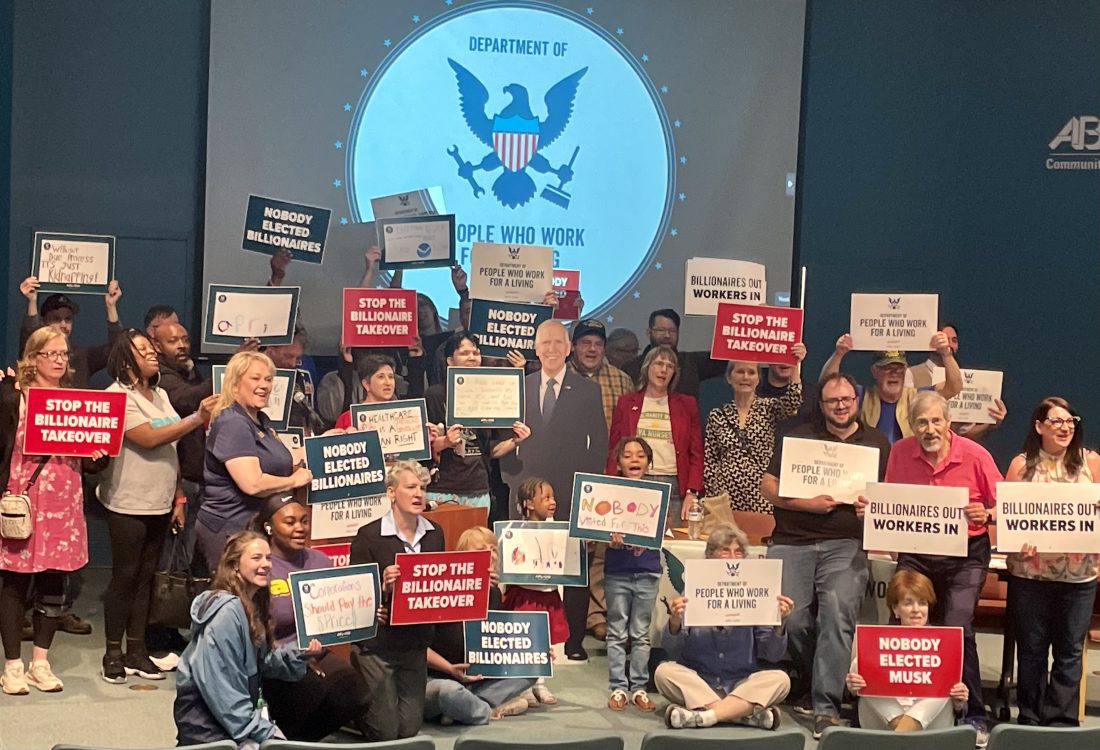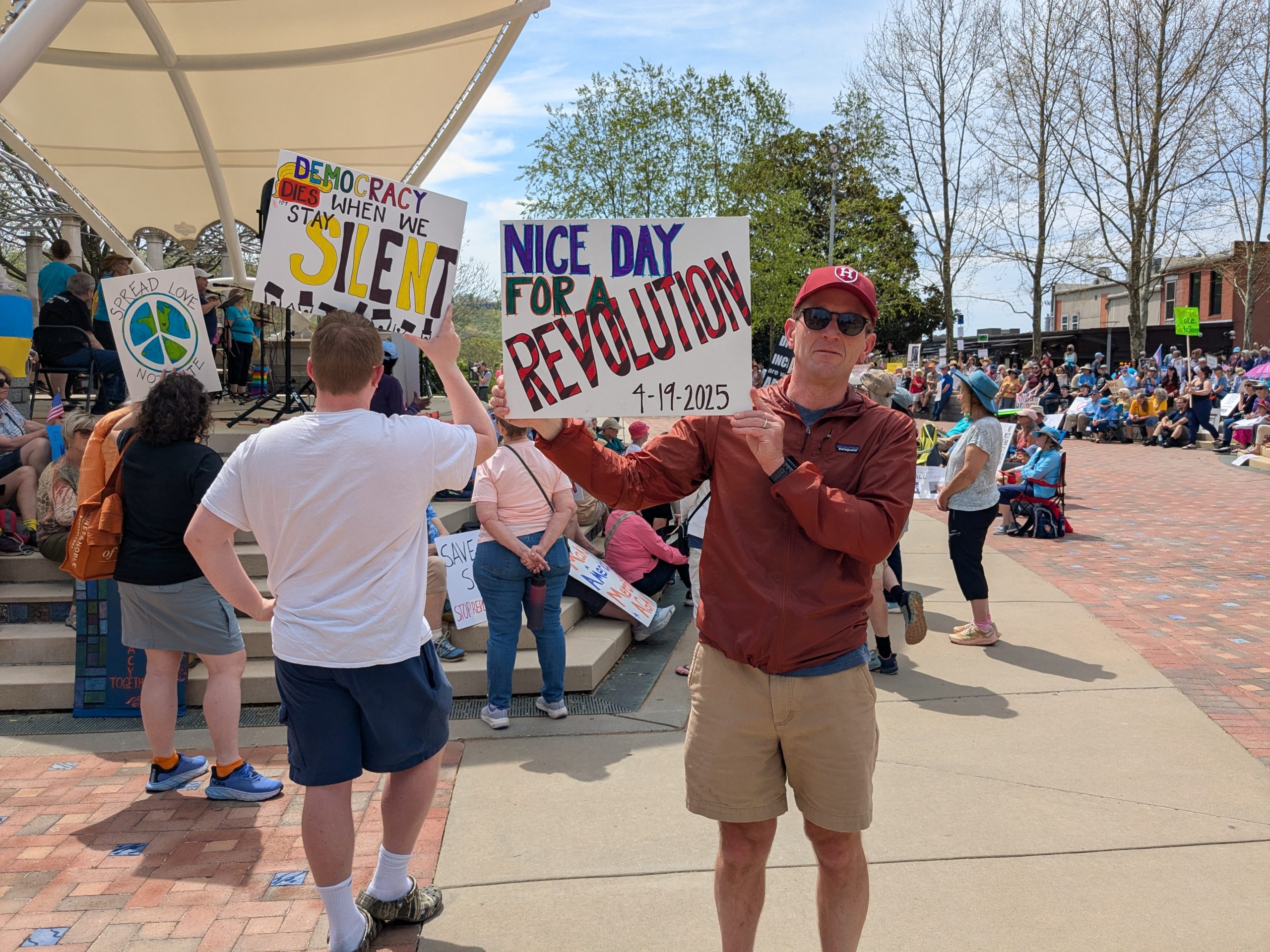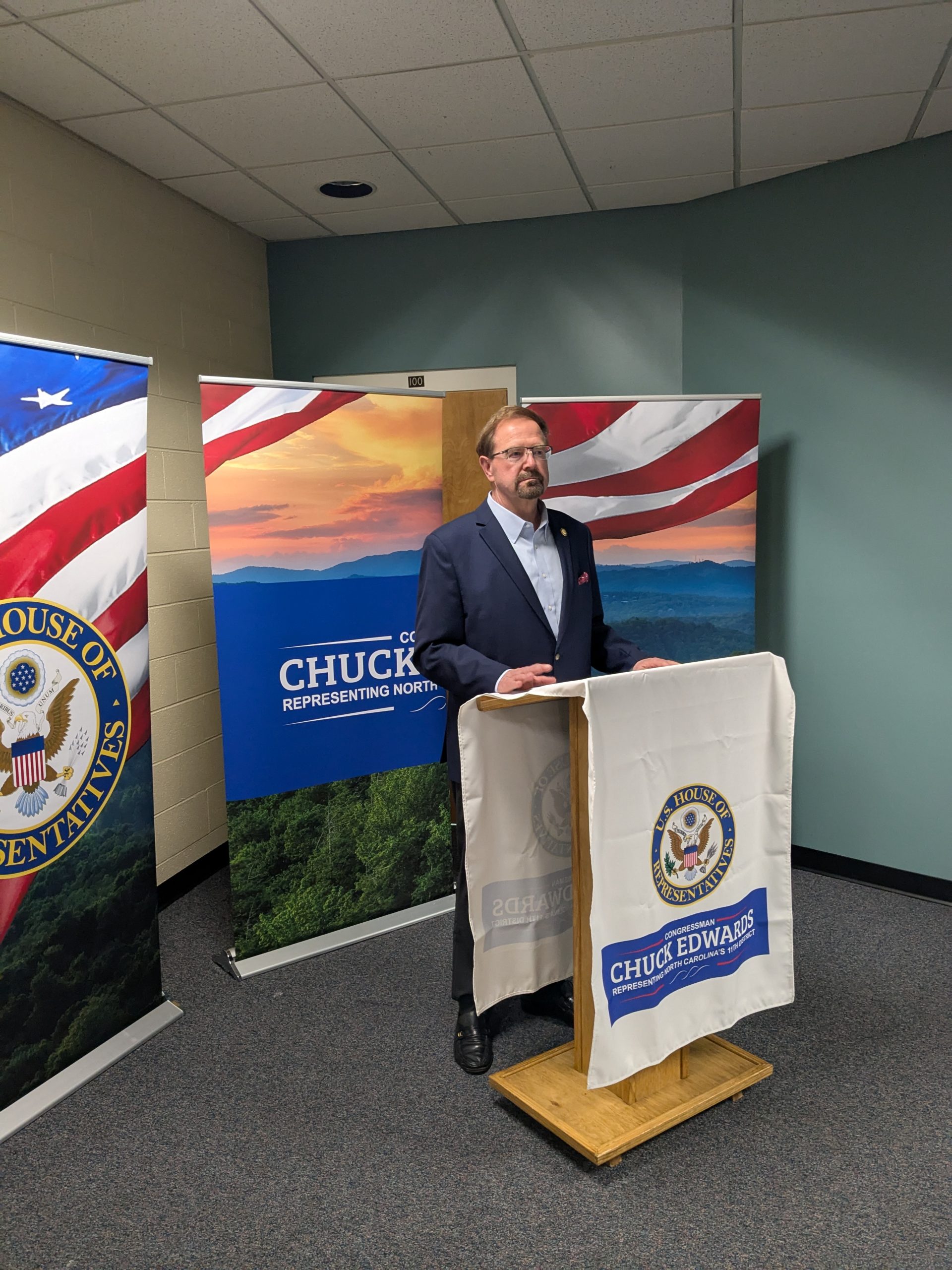The signage made it easy for attendees to find the location of the April 17 forum in support of federal workers and funding.
“Nobody elected billionaires,” read a navy blue poster taped to the door of the Ferguson Auditorium at A-B Tech. “Stop the billionaire takeover” read another.
The event was part of a series of nationwide forums held by the labor union AFL-CIO as part of its Department of People Who Work for a Living campaign to fight threats to federal workers.
Federal employees told the crowd of around 50 about the ripple effects of job and funding cuts proposed and enacted by President Donald Trump’s administration. Four workers from various agencies — the Charles George Veterans Affairs (VA) Medical Center in East Asheville, the U.S. Postal Service and National Park Service — spoke at the event, addressing their comments and questions to a cardboard cutout of U.S. Sen. Thom Tillis, who was invited to the gathering but did not attend.
“We know what’s best for our communities and for working people, and that’s steady jobs, living wages, safe working conditions and decent benefits like health care and retirement security,” said MaryBe McMillan, president of N.C. State AFL-CIO. “The government should hear just as much from us as it does billionaire Elon Musk. That’s what the Department of People Who Work for a Living is all about.”
Employees then rose to tell the audience how the cuts affected them.
‘I’ve given you my best’
Darlene Fore has worked as a nurse for over a decade at the Charles George VA Medical Center. She’s kept her job, but 14 others were fired at the center, according to a March 18 briefing in Asheville by U.S. Secretary of Veterans Affairs Doug Collins.
“I’ve given you my best. I’ve held the line and I stayed the course for you,” Fore said. She spoke of family members who had served and, with tear-streaked cheeks, said she felt angry and betrayed by the cuts.
“I see a dismantling of services for the most vulnerable of our population, and we aren’t standing up and saying, ‘Stop,’” Fore said. “I’ve lived through privatization in our communities — whether you want to call it selling out to big conglomerates or simple privatization — I have never seen it work to improve care for any of us. It has always decimated care. It has always been about money, and they’ve always put that above the person.”
Speaking about local job cuts at the National Park Service, James Jones, an employee for the Blue Ridge Parkway, said, “I’m telling you our water systems, our sewer systems, our roadway, our trails, especially in the aftermath of [Tropical Storm] Helene, it’s in bad shape, folks, and this administration, to insult us by saying we’re going to cut another 25% of your staff is absurd. And it’s not just hurting the employees, it’s hurting you folks. Folks that love their parks, that love the parkway.”
Jones clarified he was not at the event on behalf of the National Park Service and that his views are his own.
Impact on health
Focusing on threatened cuts to Medicaid and Medicare, Lori Hendrick, a nurse at Mission Hospital and a member of National Nurses United, asked the Tillis stand-in, “Are you going to stand with the 3 million people in North Carolina who require Medicaid for their health and well-being, or are you going to side with billionaires? Please take care of my patients,” she said.
Others pressed Tillis to take action.
Tavon Wells, president of the local branch of the National Association of Letter Carriers (NALC), asked, “Are you going to support the dismantling of the [U.S.] Postal Service, or will you vote to let us continue the job we have been doing for 250 years?”
Wells, who was wearing a “U.S. Mail Not for Sale” T-shirt, said that if the Trump administration folded the Postal Service into the Commerce Department as suggested, it could cost him a lot. “If they were successful, I’ll stand the possibility of losing my job, losing my home, losing my vehicle and my health benefits,” Wells said.
Christine Surrette, District 4 national vice president of workers organization AFGE, spoke about Social Security staffing cuts.
“As of February, the average time to process a claim was 236 days for decisions issued in the initial stage and 277 days for appealed cases. Over a million people are waiting on an appeal, and tens of thousands are dying while they’re waiting for a decision,” Surrette said, adding that her 80-year-old parents wake up anxious about the uncertainty of whether they will get their Social Security checks in time to pay bills.
‘Make your voices heard’
In addition to employees, a panel discussion included Blake Honeycutt, president of WNC Central Labor Council; Democratic N.C. Rep. Eric Ager, District 114; Jen Hampton, housing and wages organizer at Just Economics; and Ken Towe, executive vice president of American Federation of Government Employees (AFGE) Local 446.
Panelists advised the crowd to call their federal elected officials and continue to protest, educate one another and stand together.
Hampton said, “The time for complacency is over,” emphasizing the need for public voices at marches and protests.
Towe said he hears from employees at the VA every day about job-cut anxieties.
“I encourage everybody, every time we have rallies, every time we come together as a collective group, that you show up, make your voices heard,” Towe said. “You ain’t always got to be the loudest of the crowd, but the bigger the crowd, the more noise we can all make.”











